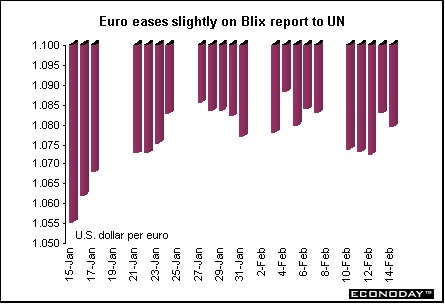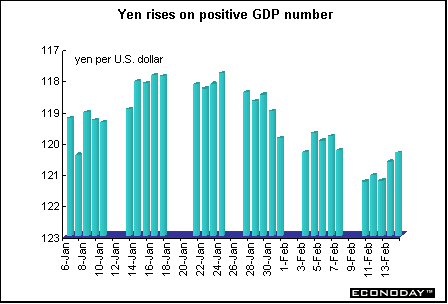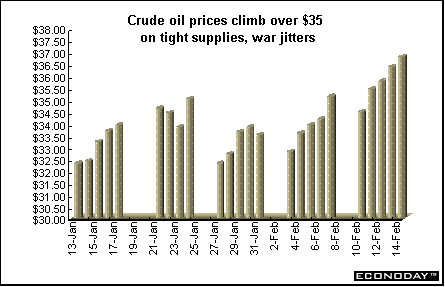
Currencies
It was a bumpy ride for the euro/dollar last week as the relationship continued to be dominated by the ups and downs in the geopolitical arena. Traders are paying little attention to economic fundamentals that normally drive currency trading. And prospects are that there will be little change in trend in the week ahead as diplomatic wrangling continues.

The yen was muddling along when traders were surprised by the much better-than-expected GDP data, which showed that the economy grew in the fourth quarter of 2002. But a number of factors could impact the yen in the coming weeks, such as the impending appointment of the new governor of the Bank of Japan. There is also the specter of intervention into the currency markets should the yen strengthen appreciably. But this is always a threat, especially as the end of the fiscal year on March 31st approaches. The value of the yen impacts exporters when earnings are repatriated.

Oil prices bubble up
In its monthly Oil Market Report, the International Energy Agency, which is an autonomous agency linked with the Organization for Economic Co-operation and Development (OECD), predicted an easing of conditions in the oil market thanks to rising Venezuelan crude exports, increasing supply elsewhere and a seasonal decline in demand. However, it listed many uncertainties - the Iraqi crisis, sub-normal temperatures in many regions, low product stocks, a difficult election period in Nigeria and unpredictability surrounding developments in Venezuela. The IEA noted that so far, the global supply chain has responded well to regional shocks. Though IEA industry and agency stocks have not been deployed, the agency said they have "played an important role in reassuring the market" and dampening speculation. The agency said that the system has worked.

However, a new threat to oil supplies is festering in Nigeria. The main oil workers' union has announced an indefinite strike that could cripple the country's crude oil exports beginning on Saturday. Nigeria is the world's seventh largest oil exporter and such a strike is likely to push prices higher in the international marketplace. The news may also alarm oil-importing countries, which are already facing high prices and the prospect of supply disruptions from the Middle East.
Industry analysts say Nigeria will lose billions of dollars in oil revenue if the strike goes ahead. The country sends more than two million barrels a day abroad. More than half of its exports go to the U.S. where supplies are already tight because of the Venezuelan situation.


Last Week's Highlights • Global Stock Market Indexes • Recap of Global Markets • Currencies • Indicator Scoreboard

The Bottom Line • Looking Ahead
|